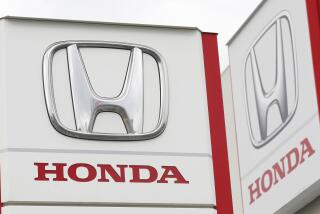Mitsubishi Admits Hiding Complaints
- Share via
TOKYO — For decades, Mitsubishi Motors employees secretly stashed tens of thousands of consumer complaints in boxes and changing rooms, behind lockers and even in the computer system using a special “H” code to signify that they should remain hidden.
On Tuesday, with a deep sigh and an even deeper bow of apology, Mitsubishi Motors President Katsuhiko Kawasoe confessed to the scheme and admitted that it was a deliberate, systemic and widespread cover-up designed to avoid costly recalls.
For the record:
12:00 a.m. Sept. 15, 2000 For the Record
Los Angeles Times Friday September 15, 2000 Home Edition Business Part C Page 3 Financial Desk 1 inches; 31 words Type of Material: Correction
Nuclear accident--A story on Aug. 23 about Mitsubishi Motors incorrectly characterized last year’s Tokaimura nuclear accident in Japan. The accident occurred at a nuclear processing facility, not at a nuclear reactor.
“We were ashamed of reporting recalls,” Kawasoe said.
About 810,000 Mitsubishi vehicles have now been identified as having previously unreported defects, including three-quarters with problems severe enough to warrant repairs at company expense. The cost to the company is expected to be in the tens of millions of dollars, the damage to its brand and reputation far worse.
The affected vehicles include about 45,000 exported to the United States. Mitsubishi stressed, however, that its U.S. complaint system was distinct from its Japanese counterpart and that several of the North American problems already have been fixed.
Mitsubishi’s problems are only the latest in a series of Japanese quality-control scandals as Japan’s once-vaunted reputation for manufacturing excellence erodes.
Japan’s Bridgestone Corp. is under fire for potentially deadly defects in tires produced by its Firestone subsidiary for the U.S. market. More than 15,000 Japanese were poisoned this summer by Snow Brand Milk Products Co. Beer maker Kirin Beverage Co. is recalling 610,000 cans of tomato juice. Last year’s accident at the Tokaimura nuclear reactor unearthed widespread lapses and weak oversight along with a worker practice of mixing uranium solutions in buckets.
“I think clearly when you look at the bigger picture, Japan is losing confidence, strength and momentum,” said Takako Nakanishi, an analyst with Merrill Lynch Japan. “We have very poor political leadership, and many Japanese feel the country is losing its shine.”
Virtually all Japanese vehicle makers have endured sizable recalls, and analysts say they do not believe that the cover-up problems are industrywide. Even Mitsubishi had a number of recalls over the years that were reported. But many of Mitsubishi’s more serious ones were not, with up to 80% of complaints kept out of the sunshine, authorities said. The fact that Mitsubishi kept the lid on problems as far back as 1977 suggests that the root of the matter is a deep-seated corporate culture of arrogance, analysts said.
Mitsubishi Motors is a spinoff of Mitsubishi Heavy Industries, a conglomerate weaned on massive government contracts, including such World War II projects as the Zero fighter and Japanese battleships.
Mitsubishi Motors has never managed to shed the group’s producer-oriented, engineer-driven outlook in favor of greater consumer orientation, analysts say. Furthermore, its biggest shareholders remained other Mitsubishi companies, not traditional investors.
“The fundamental problem is Mitsubishi is a very bureaucratic company,” said Nobuki Yanachi, an analyst with Kankaku Securities.
Further evidence of this approach is seen in Mitsubishi’s reaction to the crisis. The company originally said the problem was limited to 20 section heads. Then it was expanded to department heads. Now the government is looking at how much the board of directors knew.
Also to blame, experts say, is Japan’s regulatory system. Japanese companies must comply with extremely detailed regulations but endure relatively few surprise inspections. This allows bureaucrats to blame companies for not following the rules when scandals break out.
News reports also suggest that the few inspectors on the job at the Ministry of Transport are not computer literate and were blindsided by their dependence on paper-based information and lack of software sophistication.
Japanese consumers said they felt betrayed by Mitsubishi’s history of deceit. Hidetoshi Wakabayashi, a 54-year-old building contractor living in Tokyo, said it’s a disgrace that the company would jeopardize safety to avoid embarrassment.
“Companies in Japan have such power, and it’s easy for consumers to become docile under such a system,” he said. “Next time I buy a car, I’ll remember the Mitsubishi cover-up and probably avoid their products.”
Analysts said the latest disclosures are being watched carefully by DaimlerChrysler Corp., which recently agreed to acquire a 34% stake in Mitsubishi Motors. Mitsubishi says the cost of the recall will be at least $64 million for Japan and an additional $4.6 million abroad.
But some argued that the latest problems could actually help DaimlerChrysler gain influence over Mitsubishi. Japanese corporate culture can be highly resistant to change, and this strengthens DaimlerChrysler’s argument on the need for a major overhaul.
Mitsubishi said Tuesday that its potential U.S. recalls include suspect welds in the fuel tanks of 10,000 1995 and ’96 Galant sedans that could allow the tanks to come loose.
Additionally, a spokesman for Cypress-based Mitsubishi Motor Sales of America Inc. said the U.S. import and distribution firm is recalling 344 of its 1992-94 Montero sport-utility vehicles whose owners did not receive a recall notice issued in 1996 for a potential brake-line problem.
The company said it also is meeting with federal safety regulators to determine if it needs to launch a recall of 34,000 1995-97 Mirage subcompacts that could have an improperly tightened crankshaft pulley that could cause the power steering and generator belts to slip.
U.S. regulators and Mitsubishi executives are trying to discover just how many of the 34,000 Mirages have already been repaired since the problems were announced.
*
Hisako Ueno in The Times’ Tokyo Bureau contributed to this report.
More to Read
Sign up for Essential California
The most important California stories and recommendations in your inbox every morning.
You may occasionally receive promotional content from the Los Angeles Times.













